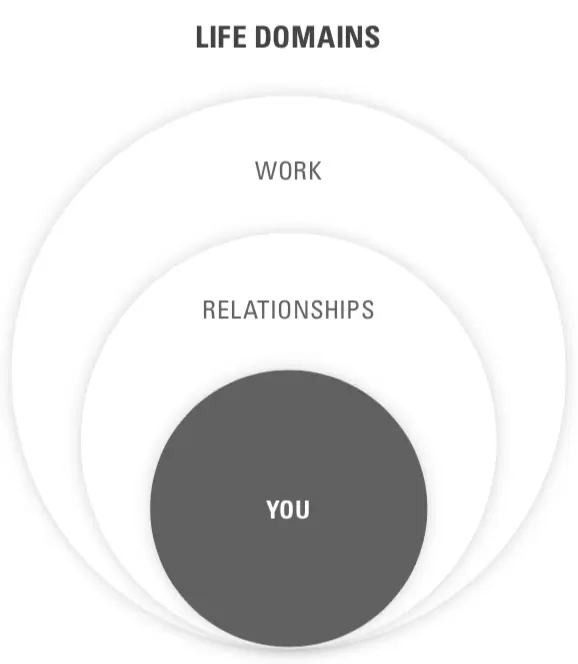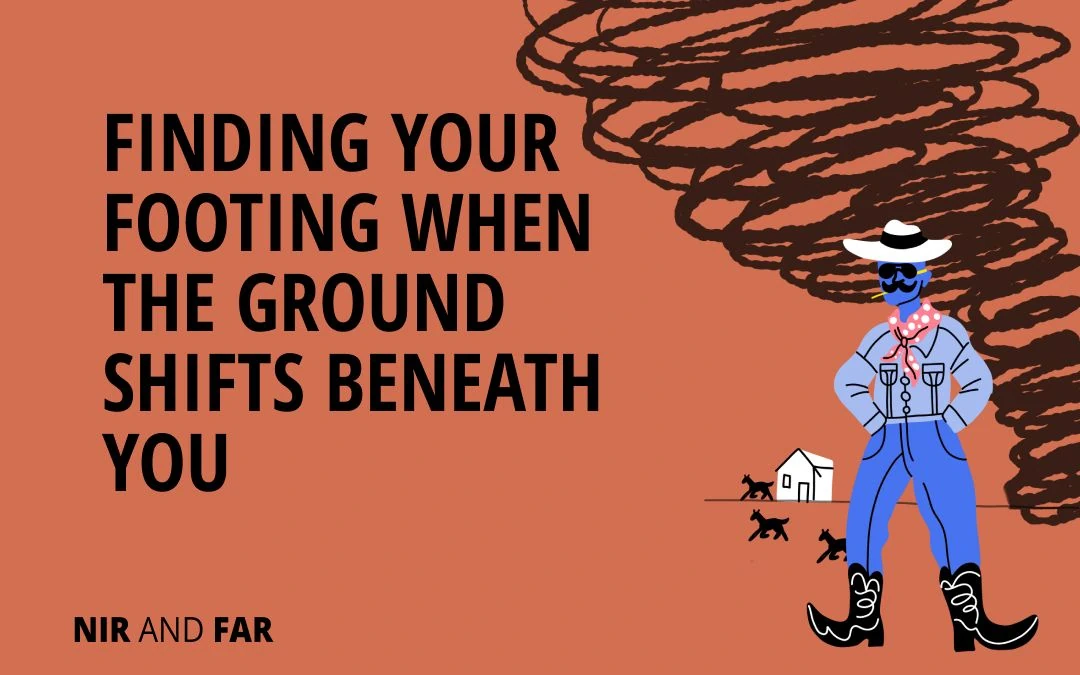Navigating job loss, political upheaval, and unexpected life changes
Imagine this: You walk into work on a normal Tuesday, coffee in hand, only to be called into an emergency all-hands meeting. Your division is being dissolved.
Or perhaps your phone alerts you to another presidential directive that threatens your livelihood or community.
Or a routine doctor’s visit turns into a life-altering diagnosis, and treatments and medical appointments take the place of canceled plans.
Or you stare at the remains of your home after a natural disaster tore through your region.
In an instant, everything changes. Your carefully laid plans evaporate. The future becomes a blur. Your brain, in its protective wisdom, either goes into overdrive or shuts down completely.
These scenarios have become increasingly common. When radical change strikes, most of us experience the sensation of having the rug pulled out from under us—whether through job loss, natural disaster, or events beyond our control.
When our world transforms abruptly, our brains shift into survival mode, triggering the fight-or-flight response. While this reaction evolved to address immediate threats, it becomes problematic during extended periods of uncertainty, taking a significant physical toll. Research on “the selfish brain” reveals that our nervous system, attempting to minimize uncertainty, prioritizes energy flow to itself at the expense of the rest of the body, reducing oxygen and glucose delivery elsewhere.
But when our instincts push us toward panic or paralysis, what actions should we take instead? Behavioral science offers a path from overwhelm to stability.
1. Honor Your Grief and Accept Reality
Before rushing into frantic job applications, drowning sorrows in alcohol, or drafting rigid self-improvement plans, acknowledge your need to grieve. You’ve experienced a significant loss. Attempting to escape your fear, panic, sense of failure, and emotional discomfort through various distractions will only prolong your struggle.
Grief serves as a portal to transformation, according to psychotherapist Francis Weller, author of The Wild Edge of Sorrow: Rituals of Renewal and the Sacred Work of Grief. “Some things can only happen in darkness,” he explained in a recorded conversation. “That’s why when we’re taken down into that underworld in grief, there are certain things that happen down there, shedding of old skins, old ideologies, old stories about oneself. … The compositing that is happening in the dark is seeding us for new life.”
To embrace grief effectively, recognize and identify your emotions as they arise, and explore them without judgment. Consider journaling about these feelings.
This approach aligns with acceptance and commitment therapy (ACT), which proposes that suppressing painful emotions ultimately creates more distress, while accepting these feelings as appropriate responses to difficult situations leads to healing.
This parallels the method I developed—informed by Dr. Jonathan Bricker’s studies on smoking cessation—to handle internal triggers, those negative emotions that drive us toward distraction. The initial steps involve focusing on the internal trigger, documenting it, and exploring the associated sensations with curiosity rather than contempt.
Weller emphasizes that self-compassion is crucial during this process to avoid self-blame. “We are addicted to self-improvement, and there’s a quality of self-hatred in that self-improvement oftentimes,” he observed in an interview.
Many mistakenly believe that recovery means bouncing back immediately, leading them to frantically pursue skill development or self-improvement in the aftermath of loss. Those efforts have their place later. But not during active grieving.
2. Direct Energy Toward What You Can Control
The psychological concept of locus of control reminds us to invest our energy in areas we can directly influence. Those with an external locus of control believe that outside forces (fate, luck, circumstances) determine life events. Conversely, those with an internal locus of control recognize that personal decisions and efforts significantly shape their lives.
An internal locus of control offers numerous benefits, including enhanced motivation and better health outcomes, but it also has potential downsides. If you’ve recently lost your job and maintain an internal locus of control, you might excessively blame yourself.
It’s essential to recognize that certain circumstances lie beyond your influence. Channel your energy toward actionable areas.
You cannot control how quickly you’ll secure another position, when repairs to your storm-damaged home will be completed, or what government policies will emerge next. However, you can control your mindset and response.
3. Cultivate Optimism
Your current circumstances may not reflect what you would have chosen, but as the saying goes, closed doors often lead to open windows. Embracing optimism consistently produces better results.
Consider employing the cognitive behavioral therapy technique of exploring the best, worst, and most realistic outcomes of your situation.
Psychologist Richard Wiseman, who conducted a decade-long study examining luck beliefs, discovered that visualizing how situations could have been worse is a common practice among “lucky” individuals. This perspective enables them to maintain optimism. In his research, participants imagined being in a bank during a robbery and suffering an arm wound.
“Lucky people viewed the scenario as being far luckier, and often spontaneously commented on how the situation could have been far worse,” Wiseman noted. “As one lucky participant commented, ‘It’s lucky because you could have been shot in the head. Also, you could sell your story to the newspapers and make some money.”
After identifying the best, worst, and most likely outcomes of your situation, develop contingency plans for addressing the worst-case scenario. Confronting this fear will enhance your optimism about the future while helping you build resilience amid uncertainty. (If you haven’t yet experienced adversity but wish to prepare for potential challenges, create a detailed backup plan.)
Another technique for fostering optimism is to identify opportunities within your unexpected circumstances (which “lucky” people instinctively do, searching for hidden advantages in difficult situations). For example, if you’re currently unemployed, you possess more free time than you’ve had in years. Use this period to reassess your life direction.
4. Reconnect With Core Values
What should fill your days after experiencing a major disruption like job loss or home destruction? How should you structure your time?
There’s no universal roadmap for recovery from unexpected setbacks. Depending on what you’ve endured, you may need to focus primarily on meeting basic survival needs.
However, periods of uncertainty also provide an ideal opportunity to reconnect with your fundamental values.
Identifying personal values and aligning your activities with them—what I call traction—represent the final components of ACT.
According to Russ Harris, author of The Happiness Trap, values represent “how we want to be, what we want to stand for, and how we want to relate to the world around us.” They define attributes of your ideal self. My personal values include being a present parent to my daughter and practicing kindness.
Acceptance and commitment therapy emphasizes realigning with your core values. Select 5 to 10 principles you want to embody from this list of core values and categorize your chosen values into three domains: you, relationships, and work (which encompasses more than employment, including volunteering and creative pursuits).

Free Habit Tracker
Design your ideal day and build your best life.
Your email address is safe. I don't do the spam thing. Unsubscribe anytime. Privacy Policy.
Next, assess your current alignment with each value: fully aligned, somewhat aligned, or misaligned.
Identify specific activities that fulfill each value, particularly those you’ve been neglecting.
Does health rank among your values, yet your previous job consumed the hours you might have dedicated to physical well-being? Now you have ample time for hiking, visiting the gym, cycling, or preparing nutritious meals.
Have you always yearned for adventure but could only plan around work constraints? Perhaps this is the moment to embark on that long-dreamed journey.
Have you wanted more quality time with loved ones? Perfect! Numerous research findings demonstrate that social support alleviates depression following trauma or loss. Strengthening these connections will accelerate your healing.
Examining life through the lens of values illuminates your next steps during uncertain times.
Engaging in activities aligned with your values creates traction, propelling you toward meaningful goals even amid uncertainty. Use timeboxing to add these activities in your calendar to establish structure when much of life seems chaotic.
During uncertain periods, you don’t need complete clarity about the path ahead. You simply need a functioning compass to guide your journey.
And remember—while uncertainty feels unbearable, the psychological principle of hedonic adaptation works in your favor. This intrinsic human capacity to return to baseline satisfaction levels regardless of circumstances means you’re likely to recover. Though the future may seem frightening, you’ll probably adjust to whatever comes more quickly than you expect.
Related Articles
- Schedule Maker: a Google Sheet to Plan Your Week
- Habit Tracker Template in Google Sheets
- The Ultimate Core Values List: Your Guide to Personal Growth
- Timeboxing: Why It Works and How to Get Started in 2025
- An Illustrated Guide to the 4 Types of Liars
- Hyperbolic Discounting: Why You Make Terrible Life Choices
- Happiness Hack: This One Ritual Made Me Much Happier

